Another day, another content deal as the UK National broadcaster, the BBC, sign a deal with YouTube/Google to make a selection of their content available on YouTube on an non-exclusive basis.
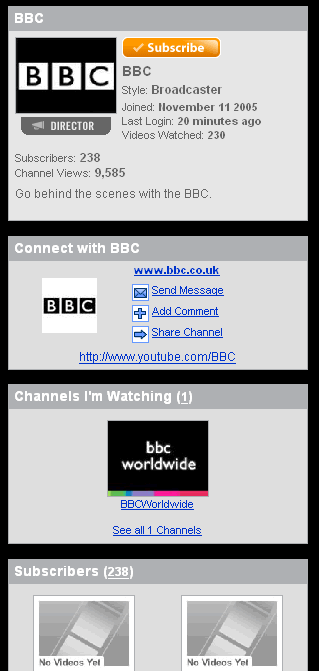 Two deals have been done, one with the BBC, the other BBC Worldwide, the commercial arm of the BBC. Financial terms of the deal aren’t being discussed at all.
Two deals have been done, one with the BBC, the other BBC Worldwide, the commercial arm of the BBC. Financial terms of the deal aren’t being discussed at all.
There will be three YouTube ‘channels’ under the deal. Two of them are live already, BBC and BBCWorldwide, with BBCWorld to follow ‘shortly.’
BBC is very much in the YouTube model, full of rough camcorder diary pieces, and behind the scenes shots giving an ‘insight’ into the workings of the BBC. Currently there are 31 pieces going back one month.
BBCWorldwide is labelled as “The best of British TV” and currently has 78 video pieces on it and contains a ton on Top Gear, Attenborough and a smattering of comedy shows like The Mighty Boosh and Catherine Tate. Will also “include a limited amount of advertising.”
BBCWorld isn’t up and running yet, but when it is, will only be available to YouTube viewers outside the UK. It will be advertising-funded.
Mark Thompson, Director-General of the BBC, likes the project, “The partnership provides both a creative outlet for a range of short-form content from BBC programme makers and the opportunity to learn about new forms of audience behaviour.
What’s it like?
Surprisingly for the BBC the quality of the video isn’t what it could be. Quite a change from the days when quality was everything.
Interestingly, fans of BBC content are barred from showing their fav ditties on any other sites as “Embedding disabled by request.” If the BBC has requested this, or YouTube isn’t clear. It’s more likely given they’ve paid the BBC for their content, and we imagine that they damn well want viewers visiting their site to see the videos.
This is great for the BBC as they get to distribute their content widely (fitting their remit) while not having to spend any money on distribution of the content, in fact receiving payment for the privilege.
 Since then, we’ve
Since then, we’ve 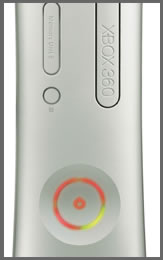 Many of the people who had purchased X360’s were finding that their machines were failing a short time after one-year warranty period had expired. The BBC say that 250 of them had
Many of the people who had purchased X360’s were finding that their machines were failing a short time after one-year warranty period had expired. The BBC say that 250 of them had 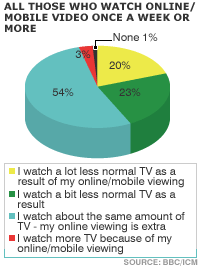 Video sharing Websites like YouTube are starting to impact on TV viewing figures, with more people switching off and logging on.
Video sharing Websites like YouTube are starting to impact on TV viewing figures, with more people switching off and logging on.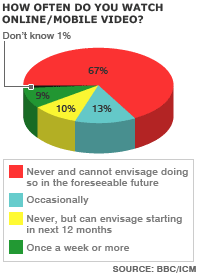 A further 13% of those questioned said they watched online occasionally, with another 10 per cent saying they expected to start in the coming year.
A further 13% of those questioned said they watched online occasionally, with another 10 per cent saying they expected to start in the coming year.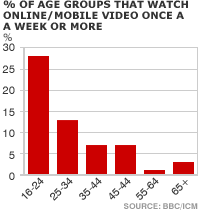 The majority of the population still prefers to watch the old fashioned gogglebox, with two-thirds of the population shunning online TV and saying that had no intention of starting in the next 12 months.
The majority of the population still prefers to watch the old fashioned gogglebox, with two-thirds of the population shunning online TV and saying that had no intention of starting in the next 12 months.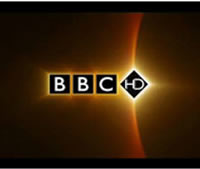 Following the trial in London, HD TV over Freeview has been judged as a success after the six months that it’s been running.
Following the trial in London, HD TV over Freeview has been judged as a success after the six months that it’s been running. Simon Fell, Director of Technology, ITV Consumer was upbeat, “We have conclusively demonstrated that HD services can run effectively alongside standard Freeview broadcasts. All major technical hurdles are behind us, and collectively we can focus on potentially providing services for the forecasted sales of 10 million flat screen TVs by 2010.”
Simon Fell, Director of Technology, ITV Consumer was upbeat, “We have conclusively demonstrated that HD services can run effectively alongside standard Freeview broadcasts. All major technical hurdles are behind us, and collectively we can focus on potentially providing services for the forecasted sales of 10 million flat screen TVs by 2010.”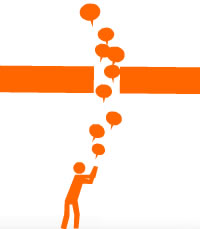 The BBC is expanding its distribution with Orange to take its international news service, BBC World, to Orange mobile phones in eight countries.
The BBC is expanding its distribution with Orange to take its international news service, BBC World, to Orange mobile phones in eight countries.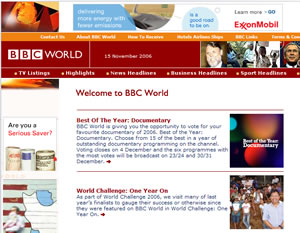 BBC World is held within the commercial arm of the BBC, so Orange are paying the BBC for the privilege of showing it to their subscribers. Gerry wouldn’t give specific details of deal, but we did learn that they don’t do deals on the number of streams that are watched.
BBC World is held within the commercial arm of the BBC, so Orange are paying the BBC for the privilege of showing it to their subscribers. Gerry wouldn’t give specific details of deal, but we did learn that they don’t do deals on the number of streams that are watched. The latest digital radio listening figures have come out in the UK. Everyone involved in the DAB radio business as they’ve all gone up.
The latest digital radio listening figures have come out in the UK. Everyone involved in the DAB radio business as they’ve all gone up. BBC Director-General Mark Thompson is back on again trying to justify to the British government why the BBC should be allowed to increase their licence fee above the Retail Price Index (
BBC Director-General Mark Thompson is back on again trying to justify to the British government why the BBC should be allowed to increase their licence fee above the Retail Price Index (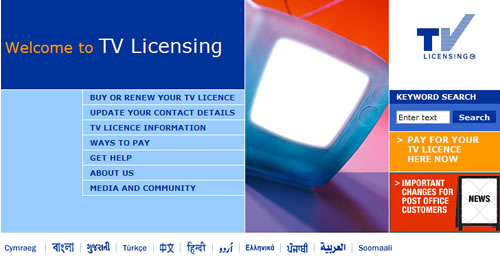
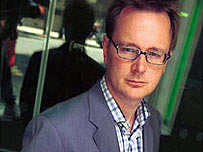 The BBC has signed a Memorandum of Understanding with Microsoft. Areas of the potential investigation and collaboration that the non-exclusive agreement includes, covers “search and navigation, distribution, and content enablement” (what ever that means in English).
The BBC has signed a Memorandum of Understanding with Microsoft. Areas of the potential investigation and collaboration that the non-exclusive agreement includes, covers “search and navigation, distribution, and content enablement” (what ever that means in English). Microsoft has been creeping into the BBC’s online media for a long time now. It first came to light when we broke the story near the start of 2004 that the
Microsoft has been creeping into the BBC’s online media for a long time now. It first came to light when we broke the story near the start of 2004 that the  Last week was the annual get together of TV ‘luvvies’ in Edinburgh and this year, as for the last few years, the current moguls felt it necessary to behave like Scrooge, reflect on their previous misdemeanours and take a bit of a look at TV to come.
Last week was the annual get together of TV ‘luvvies’ in Edinburgh and this year, as for the last few years, the current moguls felt it necessary to behave like Scrooge, reflect on their previous misdemeanours and take a bit of a look at TV to come. The spectre of Banquo’s ghost in the shape of everyone’s (now) favourite caterer, Mr Charles Allen, was there and delivered the keynote address, he of course blamed all and sundry for the mess ITV is in – ‘nothing to do with me guv’ should have been the title.
The spectre of Banquo’s ghost in the shape of everyone’s (now) favourite caterer, Mr Charles Allen, was there and delivered the keynote address, he of course blamed all and sundry for the mess ITV is in – ‘nothing to do with me guv’ should have been the title.